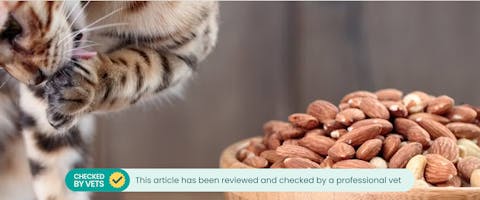Updated 12/05/2023
While nuts are packed with nutrients for us humans and maybe even help lower cholesterol, are they safe for cats? Can cats eat nuts, just like we can? Let’s find out.
Trending posts
Purr-use some of the top blogs our members have been loving this month- Top male dog names for your new furry friendGot a new furry family member in your pack? Check…

- Top female dog names for your new fluffy palWelcoming a new pooch into your family? Explore…

- 250+ gray cat names your silver feline will loveRecently welcomed a fluffy gray bundle of joy into…

- What are normal pet sitting rates?Discover the average pet sitting rates for animals…

- Unique dog names to stand out from the packDare to be different with our list of the best…

Can cats eat nuts?
The simple answer is no, nuts aren’t safe for cats. While most varieties are not strictly poisonous (unlike onions and garlic), they’re pretty harmful for a few different reasons, so it’s important to steer clear. Macadamia nuts on the other hand, are toxic to cats and can cause gastrointestinal issues along with tremors and lethargy so it's important to avoid these completely.
Let’s start off with the choking hazard. Cats are used to relatively soft food (like cooked meat and fish from food that’s specifically made for cats), or small biscuit chunks that can be easily broken down by your kitty. Nuts, on the other hand, are hard and can be difficult to chew for our feline friends, meaning they’re likely to cause choking or cause blockages in the stomach or intestines. They can also damage cats teeth as they are so hard.
Now let’s talk about fat content. Nuts are notoriously high in fat, so while us humans should only be chowing down on a small number, cats should avoid them altogether for this reason. Like other high-fat foods, they’re far too high in calories for cats to consume while also getting all the other nutrients they need from other meals. So even though nuts are non-toxic to cats, the fat content could cause serious weight gain and potentially result in diabetes or pancreatitis.
Can cats eat brazil nuts?
While brazil nuts contain vitamins C, E, B6 and A, calcium, copper, magnesium, zinc and monounsaturated fat, their high caloric content makes them super unhealthy for our feline friends. While extra vitamins and minerals are great for kitties, there are other ways to get them (like commercially available cat food).
Can cats eat cashew nuts?
Your feline friend might give you kitten eyes for cashews, but sharing them just isn’t worth it. Alongside the choking hazards that nuts pose, the fat content could cause stomach upsets like diarrhea and even pancreatitis.
Are nuts safe for cats if they’re cooked into a meal?
Chopping nuts into small pieces and cooking them into a meal might seem like a logical way to steer clear of the choking hazards nuts pose, but it’s not a good idea for several reasons. The first is that your kitty may be unable to chew through the nut’s hard texture, and still choke, have the nut cause an obstruction in their digestive tract or damage their teeth. The other is the fat content - nuts are too high in fat for them to be nutritionally viable for our kitty friends. And the last? Well there are heaps of human foods that aren’t safe for cats (see below!), so it’s likely that the meal you’re cooking the nuts into contains something either toxic to cats, or that’ll upset their stomach.
Meet our veterinary expert, Emma
This article has been checked by veterinarian Emma Chandley, BVetMed MRCVS PGCertSAS. Emma graduated from the Royal Vet College in London in 2011. She has a keen interest in surgery and went on to do a postgraduate certificate in small animal surgery and was then awarded advanced practitioner status in the same discipline.
Other foods that aren’t safe for cats
It turns out that there are quite a few foods that us humans enjoy that are either toxic to cats, unsafe or will cause an upset stomach. Any new pet parent or house sitter should be aware of the foods that aren’t safe for cats before looking after them. And the safe route? Avoid human foods altogether and stick to commercially available cat food.

